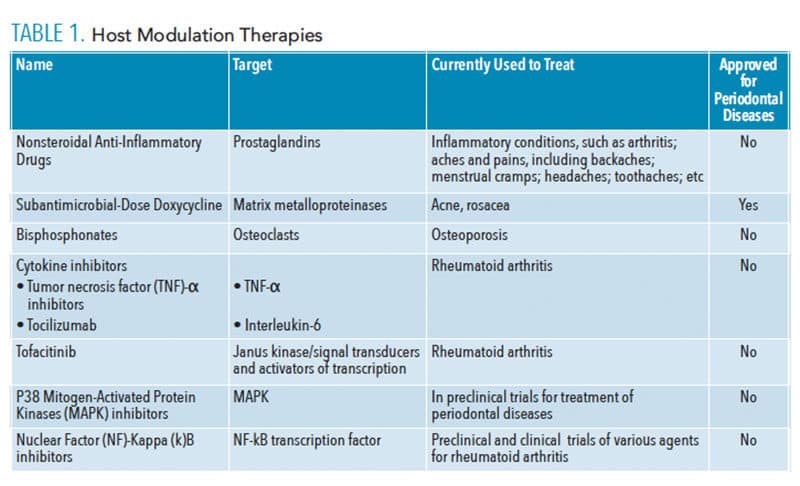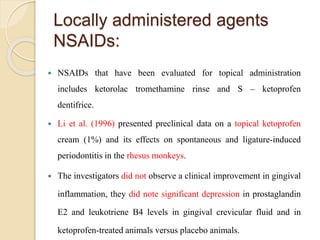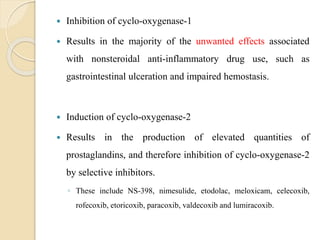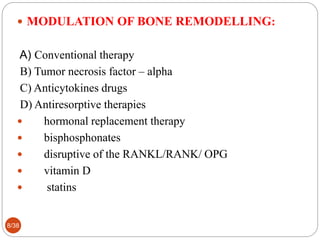For Host Modulation Which of the Following Drugs Is Used
Lack antimicrobial action but have potent host modulating effects. After the introduction of the host modulation therapy various agents are currently being investigated for host modulation including nsaids tetracyclines chemically modified tetracycline anti-cytokines agents il-1tnf blockers recombinant human il-11 recombinant tissue inhibitor of matrix metalloproteinase synthetic matrix.
However most of these therapies are not yet proven or approved treatments for periodontitis.

. Modulation of bone remodeling. Using drugs to limit the damaging effects of the periodontal disease. A Mini Review Periostat Subantimicrobial dose of doxycycline It is a subantimicrobial dose of doxycycline hyclate capsule of 20 mg that uses anticollagenase properties of tetracy- cline.
A number of articles over the past two decades have reviewed the scientific and clinical rationale for incorporating a novel non-antibacterial formulation of doxycycline in the treatment of. Modulation of matrix metalloproteinase MMP activities. Osteoclast functions host modulation therapy HMT are being used but it should not reduce below constitutive.
Page 37 Tetracyclines work well as host modulation agents because of their pleiotropic effects on multiple components of the host response. Modulation of the immune response i. Currently approved drugs are adjunct to conventional.
It is prescribed to patients with chronic periodontitis twice daily. Administration of drug for only 2 weeks. Using drugs to reduce the amount of plaque in a patients dentition.
Modulation of arachidonic acid metabolites i. - Suppress periodontopathogens - Anti inflammatory activity - Healing through persistence at low levels in macrophages and fibroblasts - Suppress the production of pro-inflammatory cytokines and increase the production of anti inflammatory cytokines. Host Modulation Therapy for Periodontal Disease.
Additional mechanistic studies resulted in the development of novel nonantimicrobial formulations Periostat now generic and Oracea and compositions of tetracyclines notably chemically modified tetracycline-3 as host-modulator drugs for periodontitis arthritis cardiovascular and pulmonary diseases cancer and more recently for. Development of resistant bacteriatoxicity is not produced by chemically modified tetracyclines. The only enzyme MMP inhibitors that have been approved for clinical use and tested for the treatment of periodontitis.
Host modulation therapy 1. Subantimicrobial-dose doxycycline Medical as well as Dental Benefits. Anti-inflammatory mediators derived from omega-3 fatty acids and work to resolve inflammation to reduce the risk of tissue breakdown and attachment loss.
Host modulatory therapy can be used to interrupt the positive feedback loops PGE2 interlukins TNF-α and MMPs The inflammation extends apically and osteoclasts themselves are targets for host modulation. Host modulation therapy refers to a treatment concept in which drug therapies are used as an adjunct to conventional periodontal treatment to ameliorate destructive aspects of the host inflammatory response. There is a paucity of literature on HMT in periodontics although the only drug approved by United States Food and Drug Administration FDA is a subantimicrobial dose of doxycycline SDD with highly predictable results as a host modulating agent in periodontal diseases and also an effective adjunctive therapy in various diseases of periodontium.
They inhibit MMPs proinflammatory cytokines and other destructive mediators. Antiproteinases represented by tetracyclines anti-inflammatory drugs and. Using drugs to reduce the amount of plaque in a patients dentition.
Previously nonsteroidal anti-inflammatory drugs have been investigated in this regard with evidence of. A variety of potential host-modulation therapies are available to treat periodontal diseases including NSAIDs subantimicrobial-dose doxycycline SDD bisphosphonates and cytokine inhibitors Table 1. Classification of host modulation therapeutics 1.
Lipoxins resolvins and protectins. Field of periodontics is still limited to few FDA approved agents like SDD future is not very far when other well-known drugs used by physicians for antiresoptive therapy will soon be available for treatment of periodontal diseases. Statins are a group of lipid-lowering drugs that are commonly used to treat.
Host modulating therapy efforts to control periodontal disease by directly targeting the host response. Using drugs to sterilize periodontal pockets. This strategy is not new in the treatment of periodontitis.
Using supplements of omega-3 fatty acids to modify host response to chronic periodontitis and reduce severity of periodontal disease. The elevation in the pro inflammatory or destructive mediators in response to bacterial challenge are counterbalanced by elevations in anti. Host modulation in dentistry commonly refers to which of the following.
A periodontal diseases chronic periodontitis. Bone-sparing drugs represented by anti-resorptive agents such as bisphosphonates. Host modulation in dentistry commonly refers to which of the following.
Using drugs to limit the damaging effects of the periodontal disease. Bone resorptions can also be suppressed with these drugs. Currently the only local host modulation agent approved for adjunctive use during periodontal surgery is an enamel matrix protein called _____ and this agent is under continuing study.
Doxycycline Erythromycin Penicillin V Amoxicillin. Using drugs to sterilize periodontal pockets. An example is the use of drugs that do this such as sub-antimicrobial doses of doxycycline nonsteroidal antiinflammatory drugs or bisphosphonates.
Three categories of host-modulating agents have been investigated in the periodontal therapy. To date the only hostmodulation therapy used clinically in the USA approved by the US Food and Drug Administration and beyond Canada Europe is a nonantibiotic formulation of doxycycline a member of the tetracycline antibiotics discussed below. NEW AGENTS FOR HOST MODULATION AZITHROMYCIN a type of macrolide antibiotic.
Agents Used in Host Modulation. Which of the following antibiotics are used in Periodontology for Host Modulation. Simvastatin and atorvastin suggested as possible host modulation agents in periodontal patients by protecting against systemic inflammation.

Host Modulation And The Inflammatory Response




Comments
Post a Comment